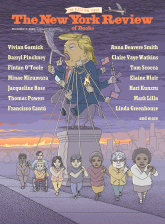In response to:
The True Cost of Vaccine Studies from the August 20, 2020 issue
To the Editors:
While I sincerely appreciate Marcia Angell’s and Carl Elliott’s concern for the well-being of potential Covid-19 challenge trial participants [Letters, NYR, August 20], their opposition to challenge trials diminishes the agency of volunteers like myself, who acknowledge the uncertain and significant risks involved and still want to participate.
Over 35,000 people have expressed interest in participating in a challenge study with 1Day Sooner (where I serve as communications director). Writing about this organization, Elliott states that the “number of people willing to volunteer without being told about the fine print” is a “recipe for exploitation.” This claim is inaccurate and misleading. Our survey makes clear that there will be several rounds of prequalification before volunteers could formally consent to a challenge trial. 1Day Sooner exists to prevent the very exploitation that Elliott brings up: we are the only organization comprised of challenge trial volunteers that is actively working to include such volunteers in challenge trial design. We do not want to risk our lives for a fruitless trial, and we have no interest in dodging the fine print.
We are also not mere means to an end, as both Angell and Elliott argue. Since our motivation is to reduce the misery caused by Covid-19, volunteering for a challenge trial that could help scientists fight the pandemic is entirely harmonious with our rights, dignity, and interests. There may be hidden, long-term impacts of Covid-19 that we do not know when the trial begins, but it is safer for young, healthy volunteers to incur those risks in the context of a closely monitored study, rather than vulnerable populations without access to health care.
There is a long history of pathologizing altruism in medical contexts. Altruistic living kidney donations were forbidden until the 1960s because researchers thought that potential donors must be uninformed, irrational, or deranged. Now, we realize that this is not the case. In the context of a potential Covid-19 human challenge trial, we should avoid repeating mistakes of the past. That means ensuring a robust informed consent process and free, high-quality health care for trial participants, but it also means not paternalistically dismissing volunteers’ altruism as opportunities for exploitation.
Abie Rohrig
Communications Director
1Day Sooner
New York, New York
Carl Elliott replies:
My criticism was not aimed at research subjects. We all depend on the altruism of people willing to volunteer for medical research. But research studies must be designed in ways that do not exploit that altruism. It is wrong to ask research subjects to pay for their own medical care if they are injured in a study; it is wrong to deny them compensation for pain, suffering, and the inability to work; it is wrong for sponsors to rig research studies and bury or spin the results; and it is wrong to deny poor people access to necessary drugs, vaccines, or medical devices, especially when they are produced by research studies for which those people have volunteered. I have not seen any mention of these serious problems by those advocating for challenge studies. If it is paternalistic to insist that the problems be fixed, then I plead guilty to the charge.



